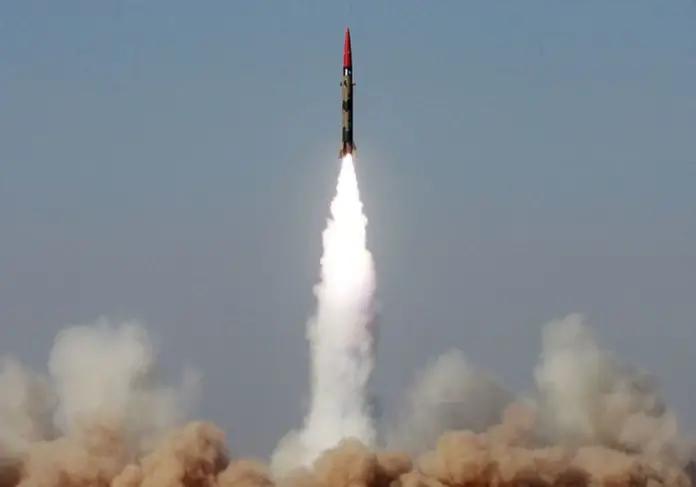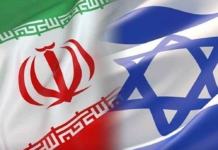By Muhsen Ali Turk
By Dr Shabbir Sarwar
In the evening of May 28, 1998, [then] prime minister Muhammad Nawaz Sharif in a televised speech to the nation announced that Pakistan has successfully carried out five nuclear tests keeping in view India’s nuclear tests and threats to Pakistan’s security. The announcement was strongly welcomed by people all over Pakistan and Pakistanis living abroad besides Muslims of the world, especially Kashmiris, Palestinians and others who are facing occupation and subjugation. During the course of his speech, the prime minister had mentioned that Pakistan expressed maximum restraint in the face of India’s nuclear threats but the world reaction over Indian aggressive postures was lukewarm. “India was not punished for using the nuclear options which endangered peace and security in the South Asian region,” he told the nation, and foreign journalists after the address.
India’s nuclear tests on May 11 and May 13, 1998, had destroyed the strategic balance and deterrence that had existed between the two South Asian neighbours. Analysts already pointed out that Indian leadership’s reckless actions shocked the entire region. In the face of Indian threats, “we have chosen the path of dignity and honour; and our nation will uphold its dignity in this hour of trial,” Nawaz Sharif had said. It is pertinent to mention here that Pakistan’s decision to push forward with testing and confirm its nuclear capabilities came after two weeks of intense diplomatic pressure on it not to follow India’s footsteps. The prime minister was surrounded by telephone calls from world leaders, all of whom offered to help Pakistan with ‘conventional weapons’ and ‘economic assistance’ if he [Nawaz Sharif] would skip nuclear testing. The prime minister was also warned by top aides that with a national debt of $50 billion, annual debt payments of $5.5 billion and only about one billion dollars in foreign exchange reserves, there is a ‘real threat’ that Pakistan will ‘default’ on its international loans, which could lead to spiraling inflation, currency devaluation and social and political upheaval.
But Nawaz Sharif issued orders to the military officials to make preparation to give response to the aggressor in the same manner. He neither accepted a ‘huge economic package’ nor bowed to any kind of international pressure. Soon after the nuclear tests, the Pakistan government appreciated clear support of friendly countries – especially China – in the face of Indian threats and its nuclear option. These five nuclear tests were the first by any Muslim country. The nuclear tests created a balance of power in South Asia and gave a strong message to all aggressors in the region and outside. Becoming a symbol of peace for the region, May 28 is an unforgettable day when the nuclear tests made Pakistan’s defence invincible. Like every year, the Youm-e-Takbeer celerbrations started today (Saturday) in the country with national zeal and fervour to commemorate historic nuclear tests.
Prime Minister Muhammad Shehbaz Sharif has already announced 10-day celebrations on the completion of 24 years of the historic nuclear tests. Not to forget crediting the founding father – the nuclear tests were basically culmination of a daring journey took on by former prime minister Zulfikar Ali Bhutto to make Pakistan’s defense invincible against aggressor that orchestrated and convincingly separated Pakistan’s eastern wing in 1971. Later, despite of regime changes, Gen Zia ul Haq, Nawaz Sharif, Benazir Bhutto and again Nawaz Sharif despite changing other policies of their rival political parties, continued their support to the team of scientists lead by Dr Abdul Qadir Khan. The team provided basis to the organization which was named as the Pakistan Atomic Energy Commission. It was the will and determination of Pakistani nation and its leadership that removed all hurdles on way to achieving this milestone. Both Zulfikar Ali Bhutto and Muhammad Nawaz Sharif as the prime ministers made Pakistan a nuclear power while giving a befitting reply to India’s hegemonic designs and global conspiracies.
In his last interview, father of Pakistan’s nuclear program Dr Abdul Qadir Khan had said that the ‘fall of Dhaka’ in 1971 broke his heart and made him realize that Pakistan’s defense was ‘fragile’ without the nuclear capability. “I had a serious thinking that India will dare again to harm Pakistan’s integrity,” he had said. “My desire to make Pakistan a nuclear state made me to offer whole-hearted support and services to prime minister Zulfikar Ali Bhutto for establishing the nuclear program. He [Bhutto] reposed full trust in me and provided required paraphernalia to achieve this goal,” he had said. It was an uphill task for Dr AQ Khan, his team and the nation as well in view of numerous economic challenges. “Our unwavering resolve surmounted all hurdles to make country’s defense impregnable,” Dr AQ Khan said. The nuclear bomb was created in the record time period of seven years by the Pakistani scientists who worked round-the-clock to achieve this goal.
It was the afternoon of May 28, when a button was pressed and dark mountains of Chagai turned into dust and glowing radiant due to powerful detonation of the underground nuclear device. A short video released on this occasion clearly manifested the jubilation on the faces of those present on the occasion. But, it was not all, it was the day of jubilation for the whole nation. Even today, the jubilant voice of Naara-e-Takbeer reminds us of our duties to always stand firm in challenging times and make Pakistan and the nation unconquerable. Pakistan has made it clear to the world community and aggressor that the nation’s nuclear program is for deterrence and Pakistan will never first use this option. Instead of a conventional war weapon this capability of the country has guaranteed peace not only between Pakistan and India but in the region as well.
Muhsen Ali Turk, with over two-decade of experience as working journalist who is mostly focusing on human interest stories, conflict zones, media studies, religious and ethnic minorities, gender, and indigenous communities, is associated with Minute Mirror as Deputy Editor in Lahore
Dr Shabbir Sarwar is Assistant Professor at Department of Journalism, University of the Punjab, Lahore, with credit to publish over 30 research articles on political communication and media studies in reputed research journals, and currently also serving as Editor of The Educationist and PU News







